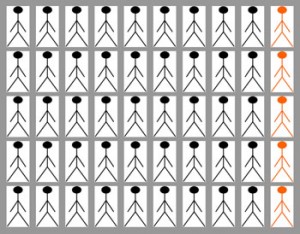Sampling > Discrepant Case Sampling
What is Discrepant Case Sampling?

Other names for this type of sampling include:
- Confirming and dis-confirming sampling,
- Discrepant Case Selection.
Negative Case Sampling
A very closely related type of sampling is Negative Case Sampling, where you choose samples that appear to wholly disprove or refute the theory being developed. Discrepant case and negative case sampling are so closely related — they both do not fit the prevailing theory — that the two terms are used interchangeably. This may not be incorrect; You would rarely know beforehand if the samples you are choosing are going to completely contradict your theory, or simply modify it. The difference — albeit a very minor one — is in your intention. If you intend to completely refute your theory, it’s negative case sampling. If your goal is to modify your theory, then it’s discrepant case sampling.
Example of Discrepant Case vs. Negative Case Sampling
For example, let’s say you were studying teenagers who dropped out of school in the last year of high school. In negative case sampling, you could choose to study teenagers who graduated high school on time. In discrepant case sampling, you could study teenagers who dropped out of high school in the 9th-10th grades, or perhaps those who went on the graduate at age 20 or 21, or who obtained their GED at a later date.
References:
Hackett, P. (2015). Qualitative Research Methods in Consumer Psychology: Ethnography and Culture. Psychology Press.
LeCompte, M. & Preissle, J. (1993). Ethnography and Qualitative Design in Educational Research. (2nd Ed). San Diego: Academic Press.